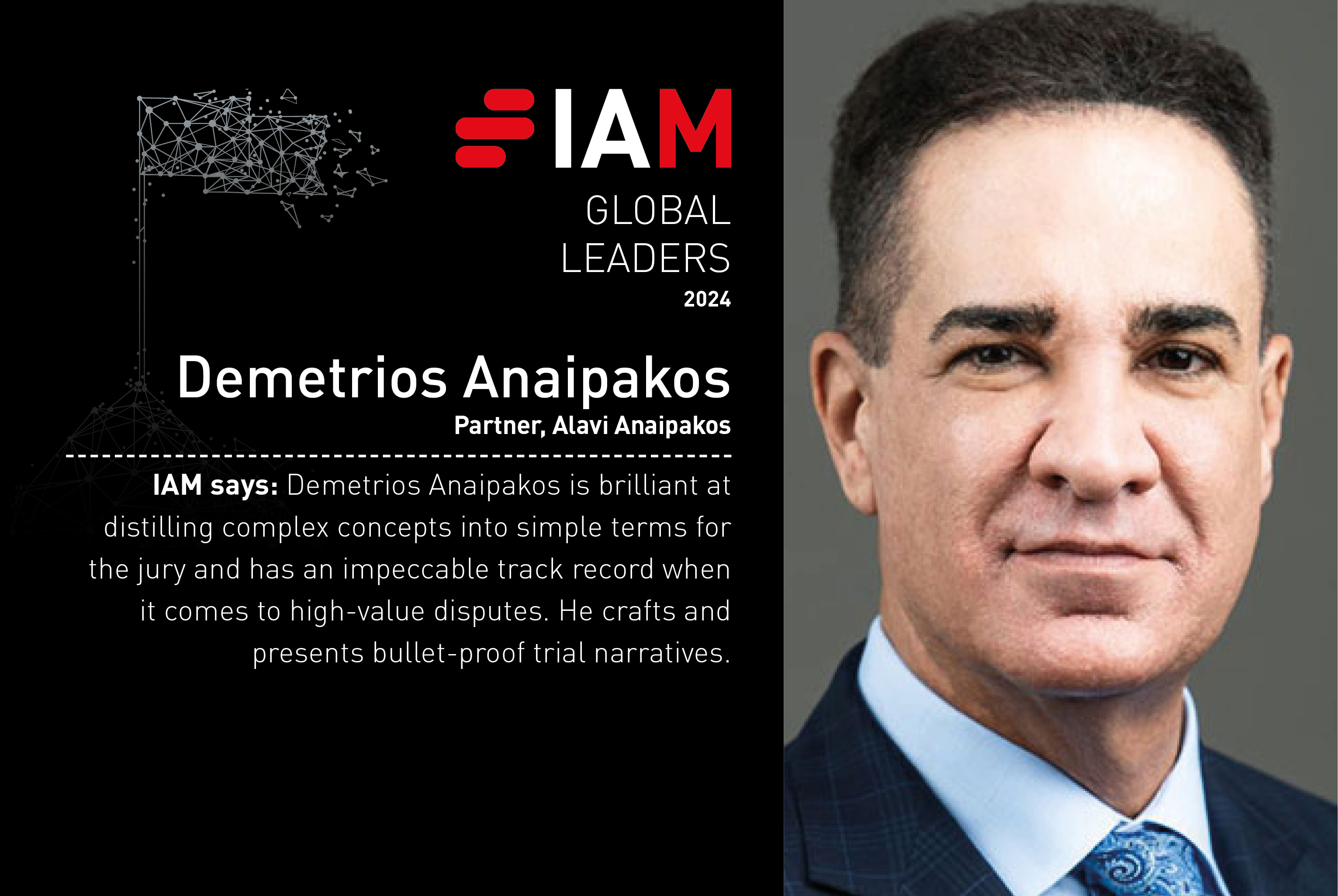Demetrios Anaipakos
 You are widely considered to be one of the top civil trial lawyers in the United States. What inspired you to pursue a career in IP law, and what advice would you give to others considering doing the same?
You are widely considered to be one of the top civil trial lawyers in the United States. What inspired you to pursue a career in IP law, and what advice would you give to others considering doing the same?
I became a patent trial lawyer mostly against my will. I loved trying cases, but formerly I avoided patent disputes like the plague, largely because they seemed too specialised and reserved solely for the anointed cognoscenti. However, when a client refused to take no for an answer, I gave it a shot and we won. Along the way, I learned that my lack of a hard science degree and a background only in patent law was, ironically, a huge asset. It meant I saw the disputes more like a judge or juror would and less like an engineering professor. I knew I was ready when I could explain the densest patent disputes to my daughters without them rolling their eyes and turning up their music. All these years later, I love the practice that I was initially forced to take. My advice to those considering a patent trial practice is simple: if I can do it, you can too. Do not let the unknown intimidate you.
What common mistakes do foreign rights holders make when enforcing their rights in the United States, and how can they avoid these?
The most common mistakes I see are: failing to consider venue options and strategies closely enough and failing to coordinate cross-border enforcement efforts when multiple cases are pending at once. Avoid these mistakes by consulting experienced trial counsel that have litigated all over the United States. Unlike Germany and other jurisdictions, we have restrictions on venue and navigating these is, in my view, the single most crucial thing you will do in your case. Also, ensure that your counsels coordinate in cross-border enforcement so that you avoid taking inconsistent positions in different courts. This sounds like an obvious point but I see inconsistencies all the time. For example, in the United States, a defendant could take the position that certain patented technology is of only marginal value, so the reasonable royalty owed should be small. In Germany, the same defendant might argue that the bond amount for an injunction should be sky high because the technology is so central to the accused product that an injunction would be highly disruptive and damaging. Talking out of both sides of your mouth is a bad idea, even if you are doing it in different languages.
How have you had to adapt your litigation strategy in the face of volatile economic headwinds?
We have helped clients respond to economic considerations by helping them find, evaluate and partner with a wide array of litigation funders. We have also assisted clients in insuring judgments that are on appeal, including through novel structures. However, when economic headwinds blow hardest, we advise clients to evaluate all of their litigation options carefully, since the less-travelled path often offers superior risk and reward. We are increasingly active in international venues like Brazil, China, Germany and India because of this process.
What aspects of your work do you enjoy most, and why?
Nothing beats a trial. I did not become a lawyer because I dreamt in my younger years of generating a tsunami of paperwork. I obsess over how best to distill a complicated dispute and present it in the most persuasive, user-friendly way possible. When I am not trying cases, I love helping clients negotiate favourable settlements, often with novel deal structures. My practice is unique in that clients often ask me to lead negotiations with potential licensees. I enjoy that, not only because of the legal and intellectual challenges, but also because I have developed relationships with many talented in-house counsel who are technically my clients’ adversaries, but with whom I now enjoy a mutually respectful relationship.
You have secured countless victories in many high-profile cases. What is the secret to your success?
I try to be genuine in everything I do. There are many world-class trial lawyers that I deeply admire, but I have learned to stick to a style and an approach that is uniquely mine. Nothing turns off a jury or a judge faster than a pretender. I try to be myself – good, bad or indifferent. I have never enjoyed cover bands. I prefer to forge my own path and to be transparently authentic.
Demetrios Anaipakos
Partner
[email protected]
Demetrios Anaipakos is a top US civil trial lawyer and has been representing plaintiffs and defendants in significant IP disputes and complex commercial litigation for nearly three decades. Board certified in civil trial law by the Texas Board of Legal Specialization, Mr Anaipakos successfully represents clients in state and federal courts and international jurisdictions. He also manages patent enforcement campaigns domestically and in Brazil, China, Germany, Japan and the United Arab Emirates.